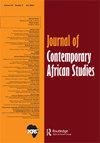“数据主权”还是“数据殖民主义”?中国参与非洲信息通信技术的探索——肯尼亚文献综述
IF 0.8
Q2 AREA STUDIES
引用次数: 3
摘要
摘要信息通信技术已成为中非关系的重要组成部分。正如学者们所指出的,非洲的第四次工业革命(4IR)有可能转变为外国行为者利用非洲数据的新“争夺战”。本文从话语层面探讨了这一问题,即深入研究政策、双边协议和法律。重点特别放在肯尼亚,因为肯尼亚是非洲最发达的信息和通信技术市场之一,中国科技巨头华为于1998年就在这里开始投资。通过文件审查,该文章对肯尼亚行为者在自己的4IR方面被有效(剥夺)权力的程度进行了初步评估。分析表明,泛非和双边协议仍然处于高度抽象的水平:虽然这是中国关于技术创新的典型话语框架,但它也为政治策略和潜在形式的数据殖民主义留下了空间。本文章由计算机程序翻译,如有差异,请以英文原文为准。
‘Data sovereignty’ or ‘Data colonialism’? Exploring the Chinese involvement in Africa’s ICTs: a document review on Kenya
ABSTRACT Information and Communication Technologies (ICTs) have become a crucial sector of China–Africa relations. As scholars have noted, Africa’s 4th Industrial Revolution (4IR) risks transforming into a new ‘scramble’ with foreign actors harnessing Africa’s data. The present article explores this issue at a discursive level, i.e. delving into policies, bilateral agreements, and laws. The focus is specifically on Kenya in that it is one of the most developed ICT markets in Africa and it is here that the Chinese tech giant Huawei began its investments in 1998. Via a document review, the article provides a preliminary discursive assessment of the extent to which Kenyan actors are effectively (dis)empowered with regard to their own 4IR. The analysis shows that both pan-African and bilateral agreements remain at a high level of abstraction: while this is the typical Chinese way of framing discourses on technological innovation, it also leaves room for political manoeuvring and potential forms of data colonialism.
求助全文
通过发布文献求助,成功后即可免费获取论文全文。
去求助
来源期刊

Journal of Contemporary African Studies
AREA STUDIES-
CiteScore
2.20
自引率
0.00%
发文量
18
期刊介绍:
Journal of Contemporary African Studies (JCAS) is an interdisciplinary journal seeking to promote an African-centred scholarly understanding of societies on the continent and their location within the global political economy. Its scope extends across a wide range of social science and humanities disciplines with topics covered including, but not limited to, culture, development, education, environmental questions, gender, government, labour, land, leadership, political economy politics, social movements, sociology of knowledge and welfare. JCAS welcomes contributions reviewing general trends in the academic literature with a specific focus on debates and developments in Africa as part of a broader aim of contributing towards the development of viable communities of African scholarship. The journal publishes original research articles, book reviews, notes from the field, debates, research reports and occasional review essays. It also publishes special issues and welcomes proposals for new topics. JCAS is published four times a year, in January, April, July and October.
 求助内容:
求助内容: 应助结果提醒方式:
应助结果提醒方式:


